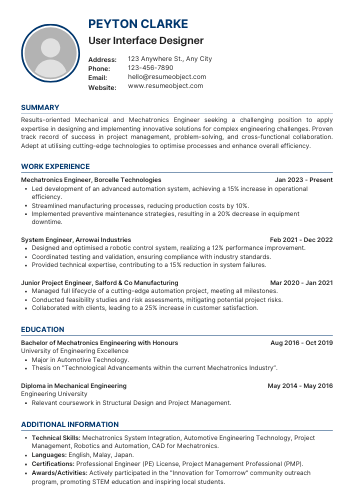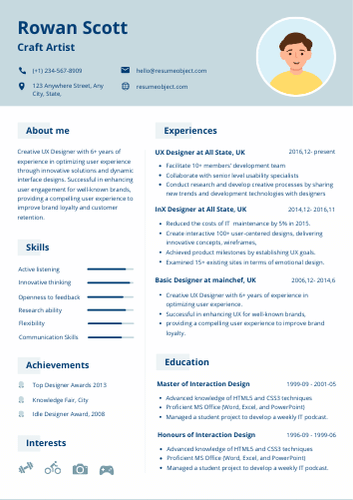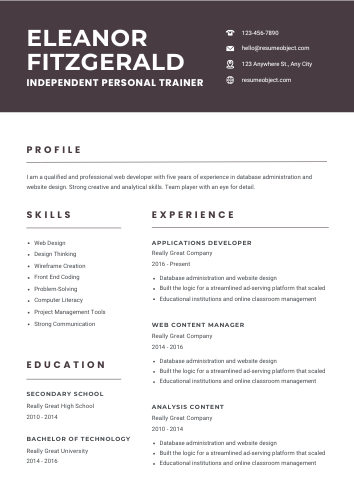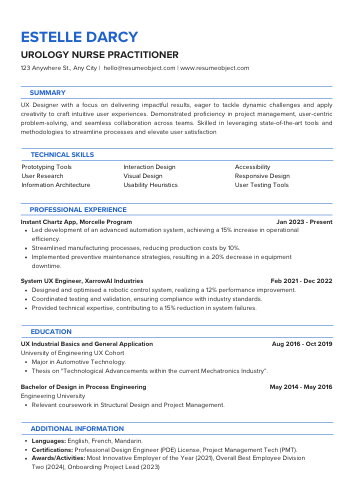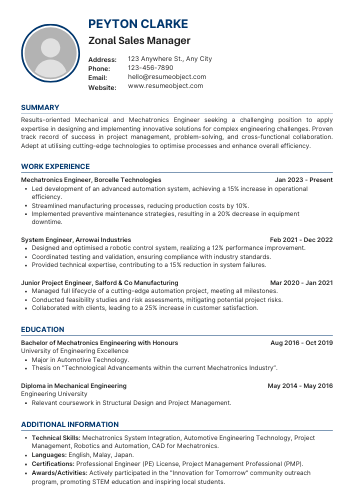Instrumentation Designer Resume
Instrumentation Designer resumes play a crucial role in showcasing your skills and experience in the engineering field. A well-structured resume template can help you highlight your technical expertise, project management abilities, and relevant certifications, making it easier for potential employers to recognize your qualifications.
In today's competitive job market, having a standout resume format is essential for Instrumentation Designers. By utilizing a tailored sample format, you can effectively present your accomplishments and demonstrate your proficiency in instrumentation design, ensuring you capture the attention of hiring managers.
Instrumentation Designer Resume Objective Statement Examples
Explore effective resume objective examples for instrumentation designers, showcasing skills and aspirations that highlight technical expertise, creativity, and commitment to enhancing measurement and control systems in various industries.
-
Detail-oriented Instrumentation Designer with over 5 years of experience in designing and implementing control systems, seeking to leverage expertise in a challenging role to enhance project efficiency and safety.
-
Results-driven Instrumentation Designer aiming to contribute to innovative projects by utilizing advanced design software and industry knowledge to optimize instrumentation layouts and improve system performance.
-
Creative Instrumentation Designer dedicated to developing cutting-edge instrumentation solutions, looking for an opportunity to apply technical skills and collaborative approach in a dynamic engineering team.
-
Proficient Instrumentation Designer with a strong background in process control and automation, seeking to join a forward-thinking organization where I can utilize my skills to drive project success and exceed client expectations.
-
Experienced Instrumentation Designer focused on delivering high-quality design documentation and technical support, eager to bring my expertise in regulatory compliance and project management to a reputable engineering firm.
For a standout career in IT, ensure your credentials shine. Explore our comprehensive guide on crafting an effective Email Administrator Resume that highlights your skills and experiences to attract top employers.
Example Summary for Instrumentation Designer Resume
This section provides a concise example of a resume summary tailored for an Instrumentation Designer role, highlighting key skills, experience, and qualifications to attract potential employers effectively.
Detail-oriented Instrumentation Designer with a strong foundation in engineering principles and hands-on experience in designing and implementing instrumentation systems. Proficient in AutoCAD and various design software, with a solid understanding of industry standards and regulations. Eager to leverage technical skills and creativity to contribute to innovative projects and enhance operational efficiency. Strong communicator and team player, committed to delivering high-quality results in fast-paced environments.
Detail-oriented Instrumentation Designer with over 5 years of experience in designing and implementing instrumentation systems for industrial applications. Proficient in using AutoCAD and other design software to create precise schematics and layouts. Adept at collaborating with cross-functional teams to ensure project specifications are met and timelines are adhered to. Strong understanding of industry standards and safety regulations, with a proven track record of improving system efficiency and reliability. Committed to delivering high-quality designs that enhance operational performance and support organizational goals.
Results-driven Instrumentation Designer with over 10 years of experience in designing and implementing instrumentation systems for various industrial applications. Expertise in developing detailed design specifications, conducting feasibility studies, and ensuring compliance with industry standards. Proven track record of collaborating with cross-functional teams to deliver projects on time and within budget. Strong analytical skills and a keen eye for detail, combined with a commitment to optimizing performance and enhancing safety. Seeking to leverage extensive technical knowledge and leadership abilities to contribute to innovative projects in a forward-thinking organization.
Similar Resumes
Key Job Duties & Responsibilities of Instrumentation Designer
An Instrumentation Designer is responsible for creating and implementing design specifications for instrumentation systems, ensuring accuracy, efficiency, and compliance with industry standards while collaborating with engineering teams and stakeholders.
-
Design Development: Create detailed instrumentation design specifications and drawings for various industrial applications, ensuring compliance with project requirements and standards.
-
System Analysis: Conduct thorough analysis of existing systems to identify areas for improvement, ensuring optimal performance and reliability of instrumentation.
-
Collaboration: Work closely with engineers, project managers, and other stakeholders to gather requirements and provide input on design feasibility and implementation strategies.
-
Technical Documentation: Prepare and maintain comprehensive documentation, including design calculations, equipment datasheets, and installation instructions, to support project execution and future maintenance.
-
Equipment Selection: Evaluate and select appropriate instrumentation and control equipment based on project specifications, budget constraints, and industry best practices.
-
Quality Assurance: Implement quality control measures during the design process to ensure that all instrumentation designs meet safety, regulatory, and operational standards.
-
Testing and Validation: Develop and execute test plans to validate instrumentation systems, ensuring they function as intended and meet performance criteria.
-
Project Support: Provide technical support during the construction and commissioning phases, addressing any design-related issues that may arise.
-
Training and Mentorship: Offer guidance and training to junior designers and engineers, fostering a culture of knowledge sharing and professional development within the team.
-
Continuous Improvement: Stay updated with the latest advancements in instrumentation technology and industry trends, applying new knowledge to enhance design processes and methodologies.
Important Sections to Add in Instrumentation Designer Resume
An effective Instrumentation Designer resume should include key sections such as a professional summary, technical skills, relevant experience, certifications, and education, showcasing expertise and aligning with industry standards to attract potential employers.
-
Contact Information: Include your full name, phone number, email address, and LinkedIn profile. Ensure that this information is up-to-date and professional.
-
Professional Summary: A concise statement summarizing your experience, skills, and what you bring to the role. Tailor this to highlight your expertise in instrumentation design.
-
Core Competencies: A bulleted list of your key skills relevant to instrumentation design, such as proficiency in CAD software, knowledge of industry standards, and project management abilities.
-
Work Experience: Detail your previous positions, focusing on responsibilities and achievements related to instrumentation design. Use action verbs and quantify your accomplishments where possible.
-
Education: List your degrees, institutions attended, and any relevant coursework. If you have certifications in instrumentation or related fields, include those as well.
-
Technical Skills: Highlight specific software, tools, and technologies you are proficient in, such as AutoCAD, MATLAB, or PLC programming.
-
Projects: Showcase significant projects you’ve worked on, detailing your role and the impact of your contributions on project outcomes.
-
Professional Affiliations: Mention any memberships in professional organizations related to instrumentation or engineering, demonstrating your commitment to the field.
-
Certifications and Licenses: Include any relevant certifications, such as Certified Automation Professional (CAP) or Professional Engineer (PE) license.
-
References: State that references are available upon request, or provide them if it’s customary in your industry.
Required Skills for Instrumentation Designer Resume
When crafting your instrumentation designer resume, highlight essential skills that showcase your technical expertise and creativity. Tailor your experience to reflect industry demands, making it easy for employers to see your value at a glance.
- Proficiency in AutoCAD
- Knowledge of Instrumentation Standards (ISA, IEC)
- Experience with P&ID Development
- Understanding of Control Systems
- Familiarity with PLC and DCS Systems
- Skills in Field Instrumentation Selection
- Proficient in Microsoft Office Suite
- Knowledge of Process Control Theory
- Experience with Data Acquisition Systems
- Strong Analytical Skills
- Ability to Read and Interpret Technical Drawings
- Familiarity with Safety Instrumented Systems (SIS)
- Project Management Skills
- Effective Communication Skills
- Attention to Detail
Action Verbs to Use in Instrumentation Designer Resume
Incorporating strong action verbs in your instrumentation designer resume enhances impact, showcasing your skills and achievements effectively. These dynamic words convey your expertise, drive, and contributions, making your application stand out to potential employers.
- Designed
- Developed
- Implemented
- Optimized
- Analyzed
- Configured
- Inspected
- Calibrated
- Programmed
- Evaluated
- Documented
- Collaborated
- Streamlined
- Innovated
- Executed
Entry-Level Instrumentation Designer Resume Sample
Looking for a fresh start in instrumentation design? Check out this sample entry-level resume that showcases essential skills and experiences, helping you stand out to potential employers and kickstart your engineering career.
Sample Resume #1
Contact Information
John Doe
123 Main Street
City, State, Zip
(123) 456-7890
[email protected]
LinkedIn: linkedin.com/in/johndoe
Objective
Detail-oriented and motivated Instrumentation Designer with a strong foundation in instrumentation principles and design software. Seeking an entry-level position to leverage skills in creating effective design solutions and contributing to innovative projects.
Education
Bachelor of Science in Instrumentation Engineering
University of Technology, City, State
Graduated: May 2023
- Relevant Coursework: Process Control, Measurement Systems, Control Theory, Electrical Circuits
- GPA: 3.5/4.0
Technical Skills
- Proficient in AutoCAD, SolidWorks, and MATLAB
- Knowledge of instrumentation design standards and practices
- Understanding of PLC programming and control systems
- Familiarity with ISA standards and safety regulations
- Strong analytical and problem-solving skills
Internship Experience
Instrumentation Intern
ABC Engineering Solutions, City, State
June 2022 – August 2022
- Assisted in the design and development of instrumentation systems for various industrial applications.
- Collaborated with senior engineers to create detailed schematics and layouts using AutoCAD.
- Conducted field measurements and data analysis to support project design requirements.
- Participated in team meetings and contributed to project planning and execution.
Projects
Senior Design Project
- Led a team of four to design an automated temperature control system for a chemical processing plant.
- Developed control algorithms and created system diagrams using MATLAB and Simulink.
- Presented project findings to faculty and industry professionals, receiving positive feedback for innovation and practicality.
Certifications
- Certified Engineering Technician (CET) - Expected December 2023
- OSHA 30-Hour General Industry Safety Certification
Professional Affiliations
- Member, Instrumentation Society of America (ISA)
- Member, Society of Automotive Engineers (SAE)
References
Available upon request.
Instrumentation Designer Sample Resume (Mid-Level)
This sample mid-level instrumentation designer resume showcases essential skills, relevant experience, and industry-specific qualifications, providing a comprehensive template for professionals seeking to advance their careers in instrumentation design and engineering.
Sample Resume #2
Contact Information
John Doe
123 Main Street
City, State, Zip
(123) 456-7890
[email protected]
LinkedIn: linkedin.com/in/johndoe
Professional Summary
Detail-oriented and skilled Instrumentation Designer with over 5 years of experience in designing and implementing instrumentation systems for various industrial applications. Proficient in AutoCAD and other design software, with a strong understanding of industry standards and regulations. Adept at collaborating with engineering teams to ensure project success and optimize system performance.
Skills
- Instrumentation Design
- AutoCAD & CAD Software
- P&ID Development
- Control Systems
- Electrical Schematics
- Project Management
- Technical Documentation
- Regulatory Compliance
Professional Experience
Instrumentation Designer
ABC Engineering Solutions, City, State
January 2020 – Present
- Developed and maintained P&IDs for multiple projects, ensuring compliance with industry standards.
- Collaborated with cross-functional teams to design and implement instrumentation systems for oil and gas projects.
- Conducted site surveys and assessments to determine instrumentation requirements and specifications.
- Created technical documentation, including design reports and installation manuals.
- Assisted in the training of junior designers on instrumentation design practices and software tools.
Junior Instrumentation Designer
XYZ Industrial Services, City, State
June 2018 – December 2019
- Supported senior designers in the development of instrumentation drawings and layouts.
- Participated in project meetings to discuss design progress and address any technical challenges.
- Assisted in the preparation of project proposals and cost estimates.
- Reviewed and updated existing design documentation to reflect changes in project scope.
Education
Bachelor of Science in Instrumentation Engineering
University of Technology, City, State
Graduated: May 2018
Certifications
- Certified Automation Professional (CAP)
- OSHA Safety Certification
Professional Affiliations
- Member, International Society of Automation (ISA)
- Member, Instrumentation and Control Engineering Society
References
Available upon request.
Instrumentation Designer Sample Resume for Experienced Level
Looking to create a standout resume as a Senior-Level Instrumentation Designer? Check out our sample format that showcases your skills, experience, and achievements, making it easy for potential employers to see your value at a glance.
Sample Resume #3
John Doe
[Your Address]
[City, State, Zip]
[Your Email]
[Your Phone Number]
[LinkedIn Profile URL]
Professional Summary
Highly skilled and detail-oriented Instrumentation Designer with over 10 years of experience in the oil and gas, chemical, and power generation industries. Proven expertise in designing and implementing complex instrumentation systems, ensuring compliance with industry standards, and optimizing project efficiency. Adept at collaborating with multidisciplinary teams to deliver high-quality results on time and within budget.
Core Competencies
- Instrumentation Design
- Control Systems
- P&ID Development
- Project Management
- Technical Documentation
- Regulatory Compliance
- Team Leadership
- Process Improvement
Professional Experience
Senior Instrumentation Designer
ABC Engineering Solutions, City, State
January 2018 – Present
- Lead the design and development of instrumentation systems for major industrial projects, enhancing operational efficiency by 30%.
- Collaborate with project managers and engineers to create and review P&IDs, ensuring alignment with project specifications and safety standards.
- Supervise and mentor junior designers, fostering a culture of continuous learning and improvement.
- Conduct site assessments and troubleshooting to optimize system performance and reliability.
Instrumentation Designer
XYZ Technologies, City, State
June 2013 – December 2017
- Developed detailed instrumentation specifications and drawings for various projects, contributing to a 25% reduction in project lead times.
- Assisted in the integration of advanced control systems, enhancing process automation and data collection accuracy.
- Ensured compliance with industry regulations and standards, resulting in zero non-compliance incidents during project audits.
Junior Instrumentation Designer
LMN Engineering, City, State
August 2010 – May 2013
- Supported senior designers in the preparation of instrumentation design packages, including wiring diagrams and equipment layouts.
- Participated in the installation and commissioning of instrumentation systems, gaining hands-on experience in field operations.
- Maintained documentation and records to ensure traceability and compliance with project requirements.
Education
Bachelor of Science in Electrical Engineering
University of Technology, City, State
Graduated: May 2010
Certifications
- Certified Control Systems Technician (CCST)
- Project Management Professional (PMP)
- OSHA Safety Certification
Technical Skills
- AutoCAD
- SmartPlant Instrumentation
- Microsoft Office Suite
- MATLAB
- PLC Programming
Professional Affiliations
- Instrumentation, Systems, and Automation Society (ISA)
- Project Management Institute (PMI)
References
Available upon request.
Resume Tips That Work for Instrumentation Designer Resume
Do
Do: Highlight Technical Skills - Emphasize your proficiency in instrumentation design software, control systems, and relevant engineering principles to showcase your technical expertise.
Do: Showcase Project Experience - Include specific examples of past projects where you successfully designed and implemented instrumentation solutions, demonstrating your hands-on experience and problem-solving abilities.
Do: Detail Industry Knowledge - Mention your familiarity with industry standards, regulations, and best practices related to instrumentation design to establish your credibility and expertise.
Do: Incorporate Certifications - List any relevant certifications or training you have completed, such as ISA or PMP, to enhance your qualifications and show your commitment to professional development.
Do: Use Action-Oriented Language - Write your resume using strong action verbs to convey your contributions and achievements clearly, making your experience more impactful and engaging to potential employers.
Don't
Don't: Include irrelevant work experience - Focus on roles that showcase your skills in instrumentation design rather than unrelated positions.
Don't: Use a generic objective statement - Tailor your objective to reflect your specific career goals and how they align with the job you're applying for.
Don't: Neglect technical skills - Highlight your proficiency in relevant software and tools specific to instrumentation design to demonstrate your expertise.
Don't: Overlook formatting and readability - Ensure your resume is clean, well-organized, and easy to read; avoid clutter and excessive jargon.
Don't: Forget to quantify achievements - Use metrics and specific examples to illustrate your contributions and successes in previous roles, making your impact clear.
Instrumentation Designer Sample Cover Letter
This sample instrumentation designer cover letter provides a professional template highlighting key skills, experience, and qualifications, helping applicants craft compelling applications that effectively showcase their expertise and suitability for instrumentation design roles.
Dear [Hiring Manager's Name],
I am writing to express my interest in the Instrumentation Designer position at [Company Name] as advertised. With a strong background in instrumentation design and a proven track record of delivering high-quality projects, I am excited about the opportunity to contribute to your team.
In my previous role at [Previous Company Name], I successfully led multiple projects where I designed and implemented control systems that improved efficiency and reduced costs. My expertise in using industry-standard software and my attention to detail ensure that I deliver accurate and reliable designs that meet project specifications.
I am particularly drawn to [Company Name] because of your commitment to innovation and excellence in the field. I am eager to bring my skills in instrumentation design to your team and help drive your projects to success.
Thank you for considering my application. I look forward to the opportunity to discuss how my experience and vision align with the goals of [Company Name].
Sincerely,
[Your Name]
[Your Phone Number]
[Your Email Address]
FAQs about Instrumentation Designer Resume
What should be included in the resume summary for an Instrumentation Designer?
A resume summary for an Instrumentation Designer should include key skills such as proficiency in instrumentation design software, experience with project management, knowledge of industry standards, and a strong understanding of control systems. Highlight relevant certifications, years of experience, and specific achievements that demonstrate your expertise and value.
How can an entry-level Instrumentation Designer enhance their resume to stand out?
To enhance an entry-level Instrumentation Designer resume, focus on relevant coursework, internships, and certifications. Highlight technical skills like AutoCAD and process control systems. Include projects showcasing problem-solving abilities and teamwork. Tailor your resume for each job application, emphasizing keywords from the job description to catch employers' attention.
What format is recommended for a mid-level Instrumentation Designer resume?
For a mid-level Instrumentation Designer resume, a reverse-chronological format is recommended. This format highlights your most recent experience first, showcasing your relevant skills and accomplishments effectively. Include sections for a professional summary, technical skills, work experience, education, and certifications to create a comprehensive and organized presentation.
Are there specific certifications that should be highlighted on an Instrumentation Designer resume?
Yes, highlight certifications such as Certified Automation Professional (CAP), Certified Control Systems Technician (CCST), and any relevant industry-specific credentials. These certifications demonstrate your expertise and commitment to the field, making your resume stand out to potential employers in the instrumentation design industry.
What are common mistakes to avoid when crafting a senior-level Instrumentation Designer resume?
Common mistakes to avoid include using a generic resume format, neglecting to highlight relevant skills and accomplishments, failing to tailor the resume for each job application, and including unnecessary personal information. Additionally, avoid jargon overload and ensure clarity and conciseness to enhance readability and impact.
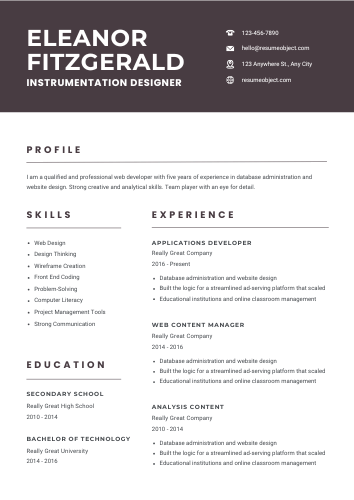
Instrumentation Designer Resume
Objective
Detail-oriented Instrumentation Designer with expertise in designing and implementing control systems, seeking to leverage skills in automation and process optimization to enhance operational efficiency and drive project success.
Summary/Description
Detail-oriented Instrumentation Designer with 5+ years of experience in designing and implementing control systems. Proficient in AutoCAD and instrumentation software, committed to optimizing processes and enhancing operational efficiency.
Top Required Skills
Proficiency in CAD software
Knowledge of instrumentation and control systems
Strong analytical and problem-solving skills
Familiarity with industry standards and regulations
Excellent communication and teamwork abilities
Mistakes to Avoid
Including irrelevant work experience unrelated to instrumentation design.
Using generic language instead of specific technical skills and tools.
Failing to quantify achievements or contributions in previous roles.
Important Points to Add
Proficiency in instrumentation design software (e.g., AutoCAD, SmartPlant P&ID)
Strong understanding of industry standards and regulations (e.g., ISA, IEC)
Experience in developing and reviewing P&IDs and control system specifications
View More Templates
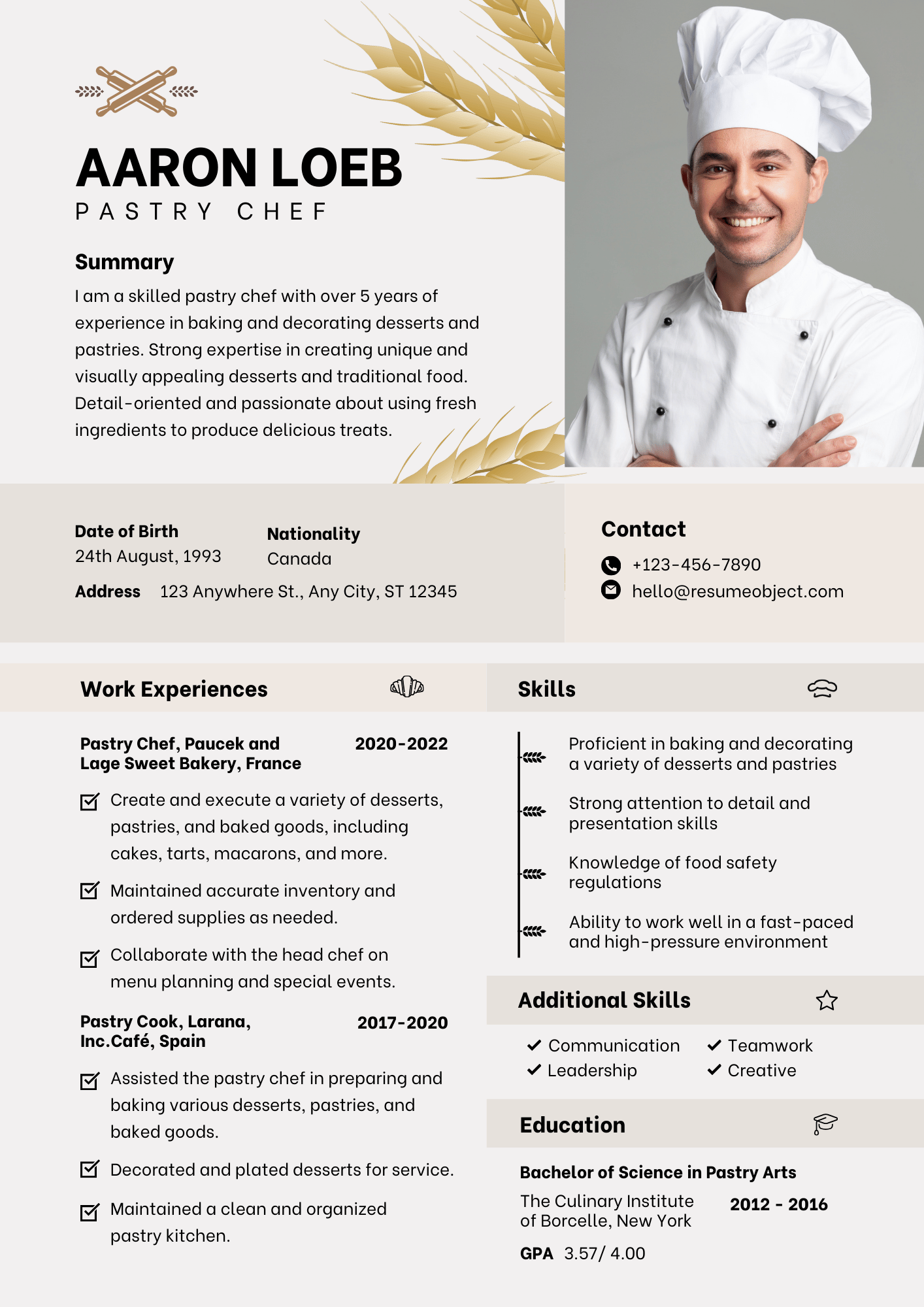 Free Resume Templates
Free Resume Templates

